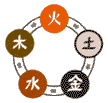 |

Gung Hey Fat Choy
"Wishing You Prosperity and Wealth"

Good Luck |

Happiness |

Longevity |

Prosperity |
The Chinese New Year does not fall on the same date each year, although it is always in January or February.
The Chinese New Year is an important celebration all over the world. There are similar celebrations in Japan, Korea, and Vietnam known as the Lunar New Year or the Spring Festival.
In the past the current emperor determined the start of the New Year. Today celebrations are based on Emperor Han Wu Di's almanac. It uses the first day of the first month of the Lunar Year as the start of
Chinese New Year.
Celebrations today are both literal and symbolic. Spring cleaning is started about a month prior to the new year and must be completed before the celebrations begin.
Typically red packets with money tucked inside are given out as a symbol of good luck. The amount is usually an even number as odd numbers are regarded as unlucky.
Lions are considered to be good omens. The lion dance is believed to repel demons. Each lion has two dancers, one to maneuver the head, the other the back.
During the New Year celebrations people do not fight or be mean to each other, as this would bring a bad, unlucky year.
Everyone celebrates their birthday on this day as well and turns one year older.
Foods during the holiday hold symbolism as well. Typically red meat is not served and one is careful not to serve or eat from a chipped or cracked plate. Fish is eaten to ensure long life and good fortune.
Red dates bring the hope for prosperity, melon seeds for proliferation, and lotus seeds means the family will prosper through time. Oranges and tangerines symbolize wealth and good fortune. Nian gao, the
New Year's cake is always served. It is believed that the higher the cake rises the better the year will be. When company stops by a "prosperity tray" is served. The tray has eight sides (another symbol
of prosperity). The tray is filled with goodies like red dates, melon seeds, cookies, and New Year Cakes.

The Chinese, with a civilisation dating some 5,000 years, have produced some of the best ways by which fortune may be met and misfortune kept in check.
 |
The Chinese Horoscope is a complex system featuring terrestrial and astrological 'forces'; the five elements (Metal, Wood, Water, Fire, Earth);
the polar opposites of Yin and Yang; directions (East, South, West, North and their various combinations); stones (precious and semi-precious);
hours (12 two-hour periods); months and seasons.
|
Find out which Chinese Zodiac Sign you belong to! Click
here
to return to main page where there is a search facility to do just that!
The year of your birth does not just indicate your age! According to the Chinese system of Astrology the year of birth indicates a certain phase or aspect of a sixty year cycle of time. Three systems are used for counting and classifying the years: The ten Heavenly Stems, the twelve Earthly Branches, and the twelve Animals.
The exact origins of the twelve animal system remain unknown and there have been various legends mentioned relating to the possible philosophy behind the animal signs.
According to the Chinese system of Astrology, each year begins early in the calendar year on a new moon - any Chinese year invariably begins with the second new-moon day after the
winter solstice. The Chinese New Year's day, therefore, is movable — just as Easter Day, which is also tributary of the moon — and takes place somewhere between 21 January and 20 February
according to astronomic circumstances. The Chinese year is associated with one of the twelve animals:
the Rat,
the Ox,
the Tiger,
the Rabbit,
the Dragon,
the Snake,
the Horse,
the Goat,
the Monkey,
the Rooster,
the Dog and
the Pig.
Their qualities "animate" the year and color it with their distinct natures.
Chinese years also evolve in cycles of ten years each. Every set of two consecutive years is governed by a Chinese cosmic element.
There are five elements in all:
Fire,
Earth,
Metal,
Water,
Wood.
Which one are you? Click
here
to find out
|
 |